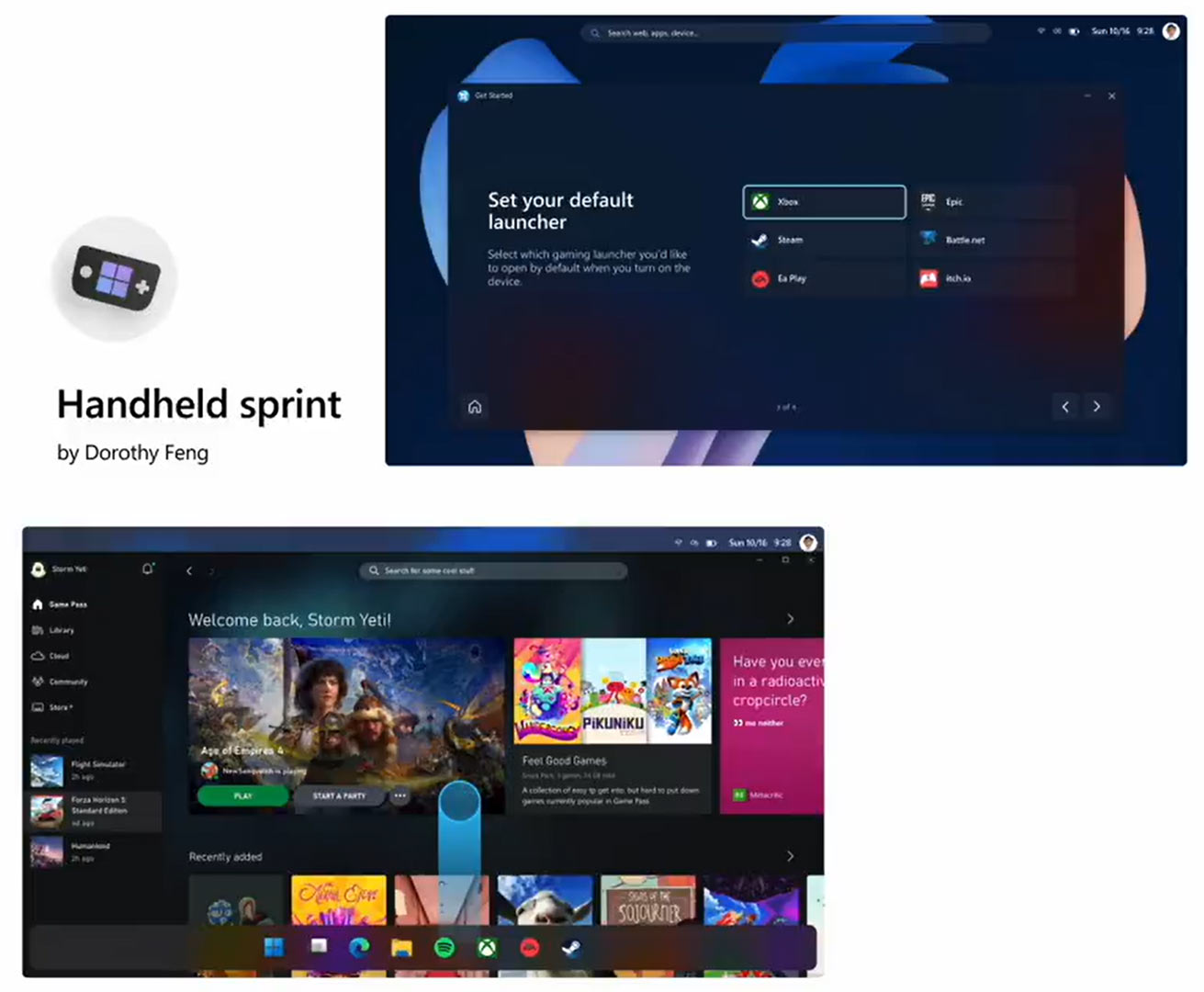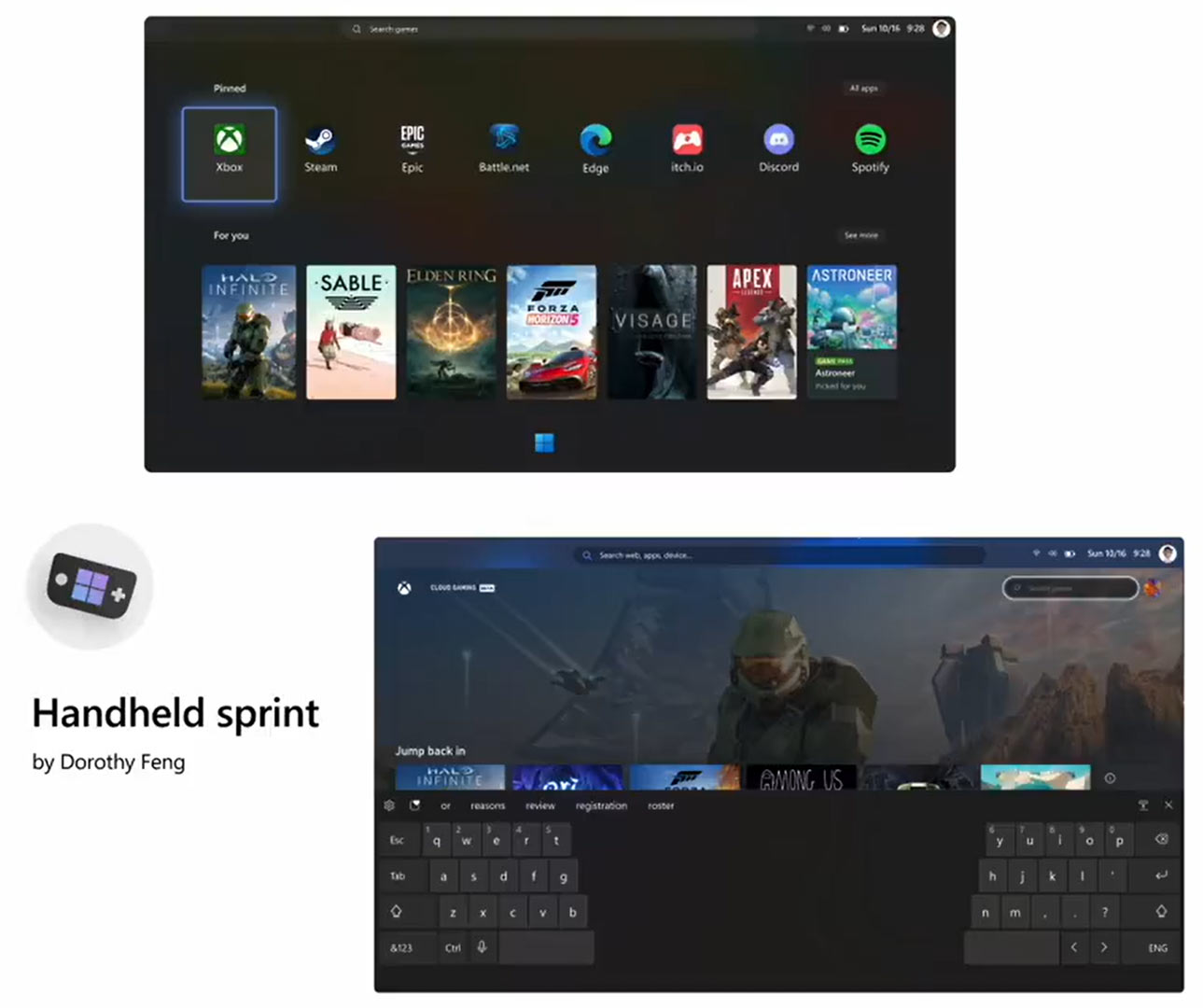Microsoft Mulling Steam Deck-Style Windows Gaming Handheld Mode
Potential evidence of behind the scenes work uncovered in leaked hackathon video.
It seems that Microsoft is cooking up some serious plans to address the nascent handheld gaming PC market. Windows-centric Twitter-based leaker WalkingCat shared a brief video which was apparently recorded during a Microsoft Hackathon in September 2022. An unnamed exec provided a voiceover to the informative video, but we note that Dorothy Feng, a senior UX designer at Microsoft, and her team, led a three week "sprint" which contributed to the Windows 11 handheld gaming mode visuals used in the video.
It remains to be seen if this will ever become a final product, so for now take the news with a pinch.
https://t.co/OWiw0f2k2v pic.twitter.com/RdSGMmhgBdApril 13, 2023
Microsoft’s work appears to have been prompted by the undoubted success of Valve’s Steam Deck, the platform’s momentum, and the proliferation of similar products. It hasn’t escaped Microsoft that the Steam Deck and its Steam OS offer a slick controller-driven handheld gaming experience on an x86 platform using a custom Linux OS. Microsoft has provided drivers for people who wish to put Windows 11 on the Steam Deck, but in this hackathon video the narrator admits that Windows on Steam deck is “pretty rough… and its not ready for prime time.”
Hackathons are event where teams get together to work on an idea. Most of the time these ideas never become real products, but sometimes they form into a product which makes it to consumers. The idea behind the hackathon project was to take a look into what a “truly optimized handheld mode,” would look like. The video narrator admits that as there is a lot of work to do, so the hackathon team started with the basics, and these were:
- Adding controller support outside of the Steam app and games
- Dealing with games not being adaptable to the unique nature of handheld displays (small, landscape mode screens)
- Games not properly working correctly with the Steam Deck’s shared memory
- Windows touch keyboard optimization for handhelds, and again making this part of Windows more controller friendly
- Other UI tweaks for handhelds, and a larger floating taskbar
The video provides some details of a three week ‘handheld sprint’ project headed up by Dorothy Feng, a senior UX designer Microsoft. The video highlights four Windows 11 handheld gaming UI elements. To start with there is a default gaming launcher dialog, which is a welcome choice-facilitating feature. Next is a finger-friendly gaming portal with expanded floating Windows taskbar. After that there is a UI with pinned apps and gaming titles for quick access. Last but not least a visual shows an adapted touch keyboard made landscape and thumb friendly for devices like the Steam Deck.


On the topic of keyboard input, the hackathon team also wanted to enable gamers to use their games controller / integrated controls to prod letters on the soft keyboard. It is noted that there is already a way to use the Steam Deck controls globally within Windows. The narrator showed a screenshot of the Steam Deck Windows Usermode Driver GitHub project page, and said that Microsoft is now (or was) working with this developer.
Recently Valve has been given notice of some very serious competition coming to the gaming handheld market. Asus launched the ROG Ally, some would say foolishly, on April Fool’s Day. But it is a very serious device, touted to deliver superior specs across the board – as well as coming with Windows 11 onboard for ultimate PC gaming flexibility. Asus has previously successfully pioneered new form factors, like netbooks, and says that the ROG Ally will be “very competitive.” Perhaps it was the one partner with enough heft to get Microsoft to put development time into this Windows 11 handheld gaming mode. If not, users might have to put up with Asus’s infamous Armory Crate app, at least initially.
Get Tom's Hardware's best news and in-depth reviews, straight to your inbox.

Mark Tyson is a news editor at Tom's Hardware. He enjoys covering the full breadth of PC tech; from business and semiconductor design to products approaching the edge of reason.